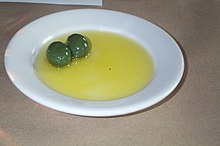oleum
Jump to navigation
Jump to search
See also: oléum
English
[edit]Etymology
[edit]From German Oleum,[1] from Latin oleum (“olive oil”), from Ancient Greek ἔλαιον (élaion, “olive oil”). Doublet of oil.
Pronunciation
[edit]- (General American) IPA(key): /oʊliəm/
Noun
[edit]oleum (countable and uncountable, plural oleums)
- (inorganic chemistry) A solution of sulfur trioxide in sulfuric acid.
Synonyms
[edit]Related terms
[edit]Translations
[edit]fuming sulfuric acid
|
See also
[edit]References
[edit]- ^ “oleum, n.”, in OED Online
 , Oxford, Oxfordshire: Oxford University Press, launched 2000.
, Oxford, Oxfordshire: Oxford University Press, launched 2000.
Latin
[edit]
Etymology
[edit]From Ancient Greek ἔλαιον (élaion, “olive oil”).
Pronunciation
[edit]- (Classical Latin) IPA(key): /ˈo.le.um/, [ˈɔɫ̪eʊ̃ˑ]
- (modern Italianate Ecclesiastical) IPA(key): /ˈo.le.um/, [ˈɔːleum]
Noun
[edit]oleum n (genitive oleī); second declension
Declension
[edit]Second-declension noun (neuter).
| Case | Singular | Plural |
|---|---|---|
| Nominative | oleum | olea |
| Genitive | oleī | oleōrum |
| Dative | oleō | oleīs |
| Accusative | oleum | olea |
| Ablative | oleō | oleīs |
| Vocative | oleum | olea |
Derived terms
[edit]Related terms
[edit]Descendants
[edit]- Italo-Romance:
- Padanian:
- Gallo-Romance:
- Ibero-Romance: (all borrowed?)
- Insular Romance:
- Sardinian: ozu
Borrowings:
- → Basque: olio
- → Faroese: olja
- → German: Oleum
- → English: oleum
- → Hungarian: olaj
- → Old Irish: olae
- → Proto-West Germanic: *oli (see there for further descendants)
- >? Proto-Slavic: *olějь (see there for further descendants)
- → Romanian: oleu
- → Russian: о́леум (óleum)
- → Serbo-Croatian: ulje / уље
- → Welsh: olew
References
[edit]- “oleum”, in Charlton T. Lewis and Charles Short (1879) A Latin Dictionary, Oxford: Clarendon Press
- “oleum”, in Charlton T. Lewis (1891) An Elementary Latin Dictionary, New York: Harper & Brothers
- oleum in Charles du Fresne du Cange’s Glossarium Mediæ et Infimæ Latinitatis (augmented edition with additions by D. P. Carpenterius, Adelungius and others, edited by Léopold Favre, 1883–1887)
- oleum in Gaffiot, Félix (1934) Dictionnaire illustré latin-français, Hachette.
- Carl Meißner, Henry William Auden (1894) Latin Phrase-Book[1], London: Macmillan and Co.
- to lose one's labour: operam (et oleum) perdere or frustra consumere
- to lose one's labour: operam (et oleum) perdere or frustra consumere
- “oleum”, in Harry Thurston Peck, editor (1898), Harper's Dictionary of Classical Antiquities, New York: Harper & Brothers
Romanian
[edit]Etymology
[edit]Noun
[edit]oleum n (uncountable)
Declension
[edit]Categories:
- English terms borrowed from German
- English terms derived from German
- English terms derived from Latin
- English terms derived from Ancient Greek
- English doublets
- English 2-syllable words
- English terms with IPA pronunciation
- English lemmas
- English nouns
- English uncountable nouns
- English countable nouns
- en:Inorganic compounds
- Latin terms derived from Ancient Greek
- Latin 3-syllable words
- Latin terms with IPA pronunciation
- Latin lemmas
- Latin nouns
- Latin second declension nouns
- Latin neuter nouns in the second declension
- Latin neuter nouns
- Latin words in Meissner and Auden's phrasebook
- Romanian terms borrowed from French
- Romanian terms derived from French
- Romanian lemmas
- Romanian nouns
- Romanian uncountable nouns
- Romanian neuter nouns
